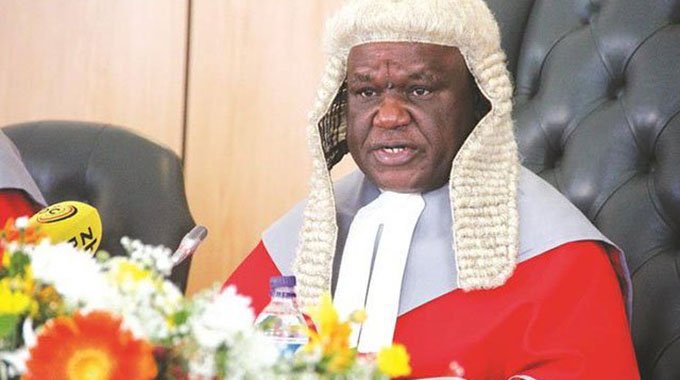By Lovemore Chazingwa
The management of public administration affairs now demands a scientific approach as it can no longer be tackled in a haphazard manner, Chief Justice Luke Malaba has observed.
Chief Justice Malaba made the remarks when he was asked to reinforce his introduction, by Justice Ministry Permanent Secretary Virginia Mabhiza, during the official opening of Ministry of Justice Legal and Parliamentary Affairs 2020 Strategic Review Plan Workshop held at Kadoma Hotel and Conference Centre (KHCC) last week.
The workshop was officially opened by Justice Minister Hon. Ziyambi Ziyambi.
“We must be aware of the fact that public administration affairs now require a scientific approach. It’s no longer done in a haphazard manner but scientific processes are now at the core.”
The highest legal office in the land outlined what he termed two main pillars of good governance, which he pointed out, are paradoxically simple and complicated, first knowing the objective of governance and secondly, understanding the means of achieving those objectives.
“Two aims of good governance exist, first knowing the objective of governance and secondly understanding the means to achieving those goals. Those are the main pillars of good governance. First know your vision, be best placed to explain it. Secondly, know how to get there. The plans and milestones don’t come easily.
The Chief Justice rallied staff in his Ministry to be critical thinkers.
“Be critical thinkers. At the end of the day it is commitment to those objectives and the means that make you successful. You need not disappoint on your mission.”
Chief Justice Malaba said he takes that exercise with the seriousness it deserves.
“I’m impressed in the sense that I came here as a person to give moral support to this exercise. I take it seriously. It does dovetail with the way I think.”
Speaking at the same occasion, Zimbabwe Electoral Commission chairperson Justice Priscilla Chigumba urged institutions, both private and public, to develop communication strategies that transcend to the grassroots if they are to be meaningful in the wake of set objectives that uplift the socio-economic status of the citizens: “Develop communication strategies that disseminate information to the grassroots if these processes are to be meaningful to our citizens. If the discussions happen and end in these closed walls they are of no substance to the people out there,” she said when she was introduced.
Development partners UNICEF, Law Society of Zimbabwe and Centre for Applied Legal Research also graced the official opening.
